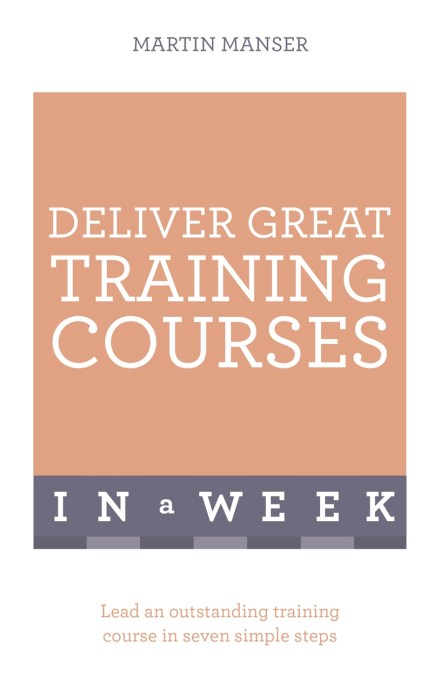Deliver Great Training Courses In A Week
On sale
11th February 2016
Price: £10.99
Training just got easier
You have probably been on both good and bad training courses. Unfortunately, it may be the bad ones that you remember – perhaps the content was badly ordered, the arrangements were poor, the speaker was boring. How can you prepare for and lead an outstanding training course? In this book we will show you how.
Sunday: What is training? What are you aiming to achieve? What are the basic different styles in which colleagues learn – and in which trainers train? What overall points should you consider and what practical arrangements do you need to think about, for example on timing and venue?
Monday: Identify the training needs clearly How to analyse participants’ training needs, using various sources; use the needs to define clear learning outcomes that are both SMART and also relevant to participants’ real work and jobs.
Tuesday: Design the course carefully How to continue to prepare well: think about the points you want to communicate and order them clearly; find a fresh angle; be motivational, inspirational and practical; write a strong beginning and round off your training well at the end.
Wednesday: Plan variety creatively Why the need to change the style of training regularly throughout the session is important to maintain participants’ interest and involvement; plan variety; consider different ways to encourage group participation; use visual aids and PowerPoints effectively.
Thursday: Implement your plan successfully Go for it! Put all your preparation into practice on the day itself. How will you make a good first impression and make the most of informal times? Body language is important; how will you overcome nerves? Learn how to deal with difficult people.
Friday: Evaluate the training thoroughly Why identifying what went well and what didn’t go so well is important; checking on ‘learning’ after the course is essential to determine changed attitudes, behaviour patterns, and so on. Review your training to see if it had its desired effects: if not, reassess and begin the process again.
Saturday: Refine your skills constantly You have completed your training course and evaluated it; now learn how to cultivate the qualities of a professional trainer, for example by keeping up to date with your subject, learning from your mistakes and mentoring a colleague to lead training courses.
You have probably been on both good and bad training courses. Unfortunately, it may be the bad ones that you remember – perhaps the content was badly ordered, the arrangements were poor, the speaker was boring. How can you prepare for and lead an outstanding training course? In this book we will show you how.
Sunday: What is training? What are you aiming to achieve? What are the basic different styles in which colleagues learn – and in which trainers train? What overall points should you consider and what practical arrangements do you need to think about, for example on timing and venue?
Monday: Identify the training needs clearly How to analyse participants’ training needs, using various sources; use the needs to define clear learning outcomes that are both SMART and also relevant to participants’ real work and jobs.
Tuesday: Design the course carefully How to continue to prepare well: think about the points you want to communicate and order them clearly; find a fresh angle; be motivational, inspirational and practical; write a strong beginning and round off your training well at the end.
Wednesday: Plan variety creatively Why the need to change the style of training regularly throughout the session is important to maintain participants’ interest and involvement; plan variety; consider different ways to encourage group participation; use visual aids and PowerPoints effectively.
Thursday: Implement your plan successfully Go for it! Put all your preparation into practice on the day itself. How will you make a good first impression and make the most of informal times? Body language is important; how will you overcome nerves? Learn how to deal with difficult people.
Friday: Evaluate the training thoroughly Why identifying what went well and what didn’t go so well is important; checking on ‘learning’ after the course is essential to determine changed attitudes, behaviour patterns, and so on. Review your training to see if it had its desired effects: if not, reassess and begin the process again.
Saturday: Refine your skills constantly You have completed your training course and evaluated it; now learn how to cultivate the qualities of a professional trainer, for example by keeping up to date with your subject, learning from your mistakes and mentoring a colleague to lead training courses.
Newsletter Signup
By clicking ‘Sign Up,’ I acknowledge that I have read and agree to Hachette Book Group’s Privacy Policy and Terms of Use


















































































